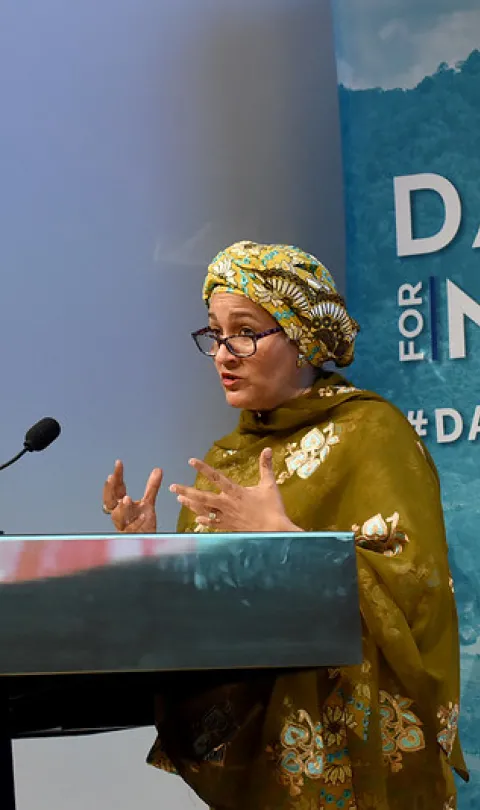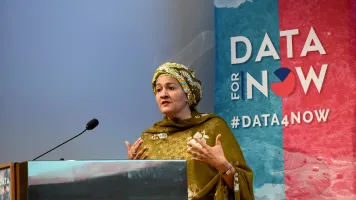Deputy Secretary-General's remarks at Data for Now Event on ‘Better Decisions, Better Lives, Accelerating SDG Progress through Timely Data’ [as prepared for delivery]
These remarks were originally published here.
Distinguished Guests,
Ladies and Gentlemen,
It’s a pleasure to join you today to discuss the steps we urgently need to take to improve the availability and timeliness of data for the SDGs.
Four years after adopting the SDGs, we are not where we need to be.
We are in fact off track.
Global hunger is on the rise.
Almost 500 million people could remain in extreme poverty by 2030.
Greenhouse gas emissions continue to increase.
Biodiversity is being lost at an alarming rate.
And no country is on track to meet the goal of gender equality – without which none of the others will be met.
There is a clear consensus that we must step up our efforts.
But to do so, we need more ambition, and in some cases, we need a different approach.
This is certainly the case in relation to data.
We all know that timely, relevant and disaggregated data is central to achieving the SDGs.
Since 2015, we have repeatedly stressed its importance for reaching those furthest behind; for securing a full understanding of the development challenges; for identifying the best policies for scaling up implementation and for ensuring accountability for commitments made.
Yet, as we enter what will be a truly decisive decade for our world, access to timely, relevant and disaggregated data remains a major challenge and a major hurdle.
An assessment of six countries by UN-DESA, for example, found that on average, across countries, data was available for just 20 percent of SDG indicators.
While another 23 percent could be accessed relatively easily, this still means that countries face serious problems in accessing data for more than half of all SDG indicators.
And even when data is available, it often lacks the detail that is necessary to inform policy.
Disaggregated data divided according to income, sex, age, race, ethnicity, migratory status, disability, geographic location and other characteristic can be used to drill down into conditions at the local level.
And then there’s the fact that exclusion from data is one of the most fundamental challenges people face.
Measurement of 65 SDG indicators, for example, depend on the quality of civil registration and vital statistics, but some 1.1 billion people around the world cannot officially prove their identity.
They are all but invisible when it comes to deciding policy and priorities; and most of them are among the most vulnerable and marginalized.
Ladies and gentlemen,
Yesterday, the Secretary-General issued a global call for a decade of action to achieve the SDGs.
Let’s respond here and now with data.
While there are many excellent initiatives underway to fill gaps in data availability, we need better coherence and we need to reach scale much more rapidly.
We need to push the boundaries and increase availability of data to feed our decisions.
Take the development of National Voluntary Contributions, data is a critical piece and we must work together to make sure it is readily available.
This requires effective collaboration and partnerships, technical support, strengthened capacities and information sharing.
That is why I want to highlight two specific initiatives today that I believe can unlock the data puzzle.
First, I am delighted to launch the Data For Now (Data4Now) initiative.
Jointly convened by the United Nations, the Global Partnership for Sustainable Development Data, the World Bank and the Solutions for Sustainable Development Network, Data4Now will build capacity sustainably, by putting governments and particularly National Statistical Systems at the forefront.
Data4Now will also maximize the use of new data sources and technology and create opportunities for collaboration and information-sharing between statisticians, data scientists and data users.
It will build a community of data users, leaders, and innovators, building new partnerships to deliver robust and timely data to will help us achieve the SDGs.
New technologies like satellite remote sensing, mobile technologies and digital census surveys are revolutionizing data collection, giving us the tools to change millions of lives for the better.
Through this initiative we can unlock data, fight for inclusion and protect people’s data privacy. We must make sure data—or lack of data—does not create or reinforce disadvantages for people.
I look forward to seeing the first results over the next few months in the countries that have already joined, including Bangladesh, Colombia, Ghana, Mongolia, Nepal, Paraguay, Rwanda.
The second initiative I want to spotlight today relates to financing.
The Dubai Declaration, announced at the second UN World Data Forum last year, calls for a transparent and inclusive Financing Data Facility.
This Facility would be driven by data needs at the national level and ensure that quality and timely data are available to governments, international organizations, civil society, the private sector and the general public.
To scale up existing initiatives, we need to mobilize more domestic resources and boost international support.
It is time therefore to make the Financing Data Facility a reality.
Let’s work together over the coming months to make this breakthrough happen.
Ladies and gentlemen,
Through these initiatives, we can blaze a trail of success, by working together to unlock data, protect people’s privacy and to fight for inclusion.
We must make sure data—or lack of data—does not reinforce disadvantage.
I call on partners and donors to stand behind Data4Now and to work together for Financing Data Facility.
The 2030 Agenda demands it.
The time for stepping up is now.
Thank you.

